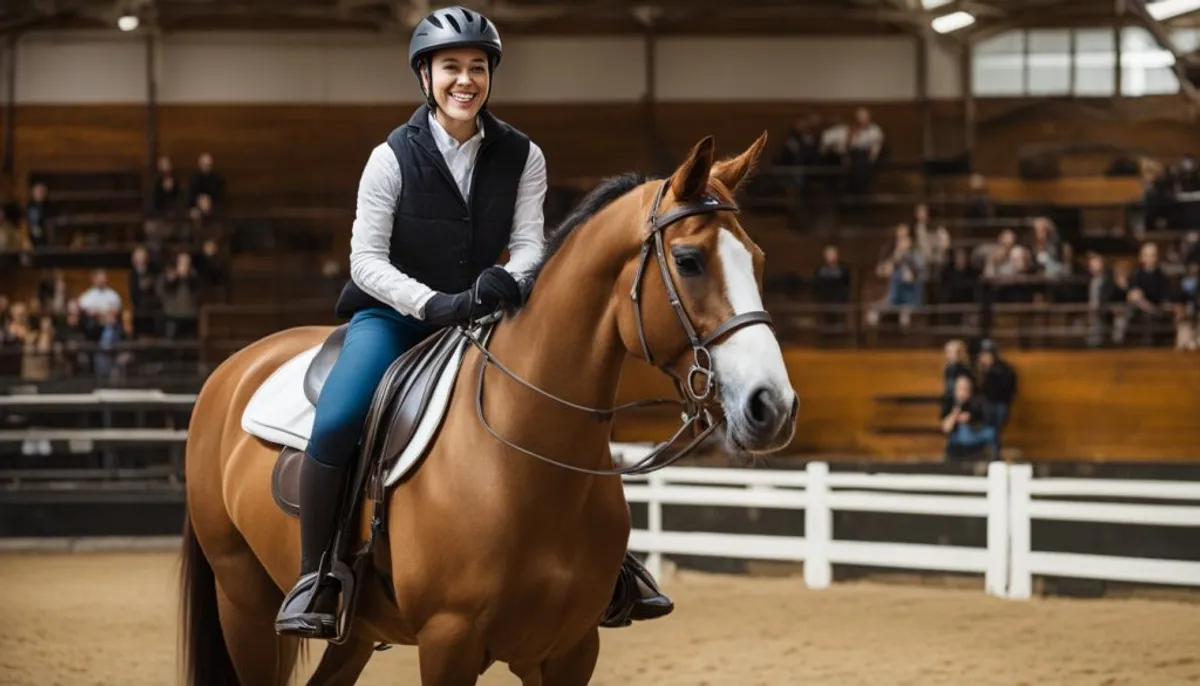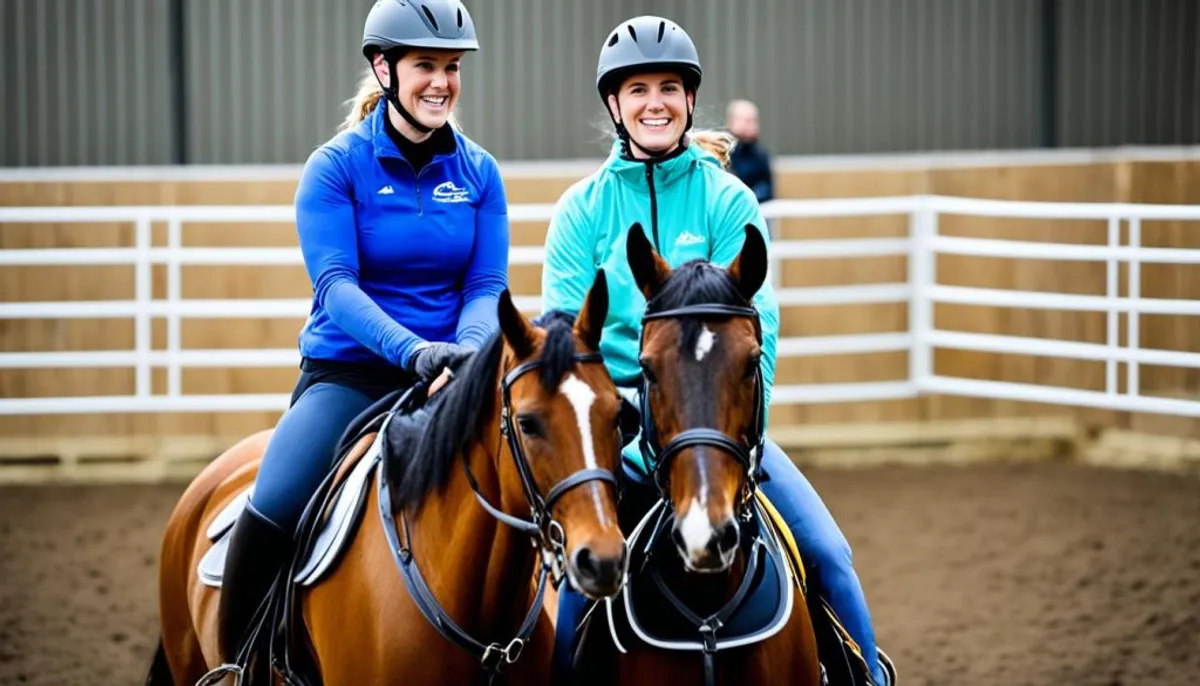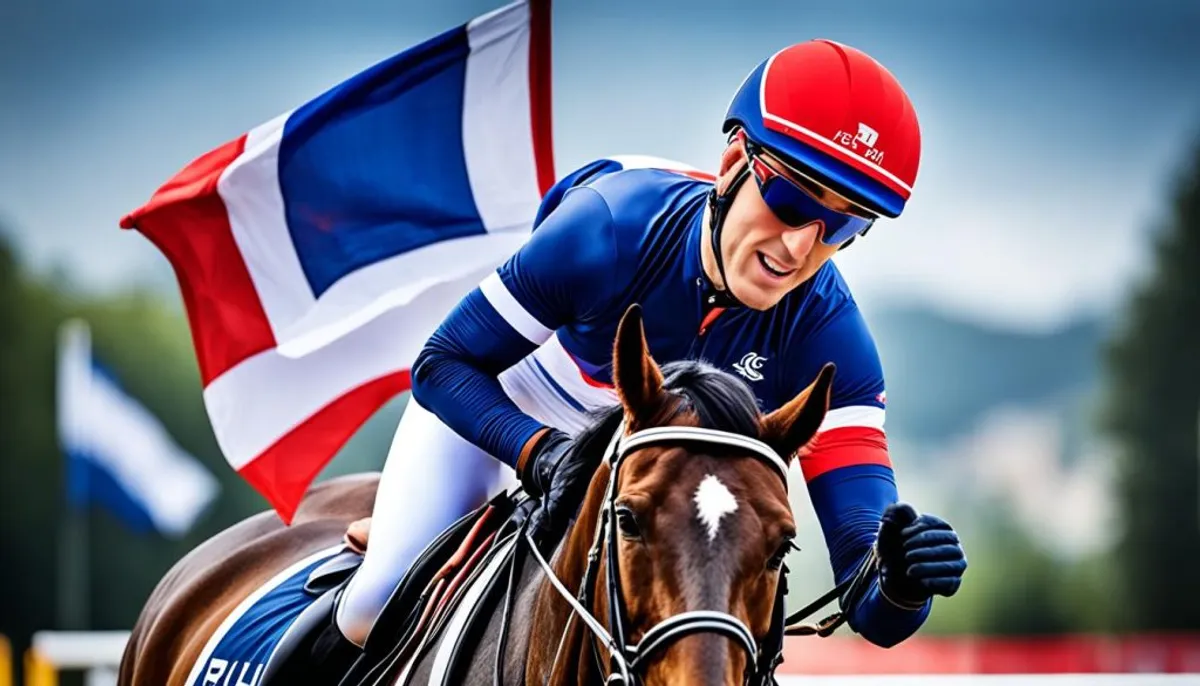Many see horseback riding as a childhood dream. It is the contact with the horse, the special relationship that develops, and the act of moving on it that are often highlighted. These elements allow many to discover and love this sport, whether for pleasure or competition.
The French Equestrian Federation (FFE) works hard to enable everyone to ride, including people with motor disabilities. In horseback riding, men and women compete together in the same event. Additionally, riders and horses receive their medals together if they win.
Dressage is also recognized at the Paralympic Games, thus showing the importance of this discipline in the equestrian world. This offers an equal chance of competition to all athletes, regardless of their gender or whether they have a disability.

Main points to remember
- Horseback riding is accessible to a wide audience, including people with motor disabilities
- The FFE is committed to making horseback riding inclusive
- Horseback riding is the only Paralympic sport where men and women compete together
- Dressage is the only equestrian discipline at the Paralympic Games
- Horseback riding offers many benefits for people with disabilities
Introduction to horseback riding for people with motor disabilities
Horseback riding can greatly help people with motor disabilities. The French Equestrian Federation (FFE) has long worked to open this sport to everyone. Regardless of age or disability, anyone can benefit from horseback riding.
This involvement has allowed horseback riding for people with motor disabilities to develop in France. As a result, integration has improved, bringing more happiness into their lives.
The importance of accessibility in sports
Access to sports is crucial for people with disabilities. The FFE has therefore worked to make horseback riding accessible. It has trained instructors and adapted facilities to welcome all riders.
This has paved the way for adapted courses, offering a warm experience to those with disabilities. More and more equestrian centers joyfully welcome them.
The benefits of horseback riding for people with disabilities
Practicing horseback riding has many advantages. Not only is it good for strengthening the body and improving balance, but it is also great for morale and social interactions.
The contact with the horse boosts confidence and autonomy. It helps them integrate better, making horseback riding a form of therapy. It is even referred to as hippotherapy or equine mediation.
Thanks to the efforts of the FFE, more disabled individuals can enjoy horseback riding. Whether for pleasure or competition, they can practice this sport. And all of this, in a supportive and understanding environment.

The French Equestrian Federation and its role in promoting horseback riding for motor disabilities
For a long time, the French Equestrian Federation (FFE) has been helping to make horseback riding possible for all. This includes people with motor disabilities. They have implemented several actions to facilitate their approach to this sport.
The Horse and Diversity Network
In 2017, the FFE established the Horse and Diversity Network. It is a place where people in the equestrian world and those with disabilities meet. Its goal is to make horseback riding accessible to everyone.
- The Horse and Diversity Network includes equestrian centers and associations specialized in welcoming people with disabilities.
- It offers training and advice to adapt equestrian activities for people with specific needs.
- It creates special opportunities to promote adapted horseback riding.
Paralympic competitions in horseback riding
France is recognized in the field of para-dressage, a discipline at the Paralympic Games. This is thanks to the accreditation of the ministerial delegation for para-dressage. The FFE works to ensure that more people with disabilities can enjoy this sport.
| Discipline | Paralympic Games | Federation in charge |
|---|---|---|
| Para-dressage | Included | French Equestrian Federation |
The actions of the FFE are truly important for promoting horseback riding for people with motor disabilities in France. They allow these individuals to enjoy this sport.

Horseback riding for motor disabilities: The different forms of adapted practice
The French Equestrian Federation has encouraged clubs in France to offer adapted courses. These horseback riding classes are open to all ages for people with motor disabilities. Horseback riding is an accessible activity that brings many physical benefits.
Equine therapy: a therapeutic approach
Equine therapy aims to help people with various types of disabilities. This includes motor, sensory, psychological, and mental disabilities. Spending time with the horse helps build confidence and improve social relationships.
This therapy is conducted by health experts. Thus, it is ideal for those with motor disabilities.
Leisure and competition horseback riding
In addition to equine therapy, other activities such as driving or approaching horses are available. They are offered at several equestrian clubs in France. There are also paralympic competitions organized by the FFE for enthusiasts.
Accessible horseback riding offers many options, whether for leisure or competition. Everyone can find joy and numerous benefits with this activity.
Equipment adaptations to facilitate practice
Adapted horseback riding helps those with motor disabilities to ride safely and comfortably. The adaptations of riding equipment change saddles, reins, and other gear.
Adapted saddles, reins, and other equipment
Technical solutions exist to ensure safety for those with motor disabilities. Adapted saddles have systems to secure the legs or safety handles. Adapted reins help steer the horse. In some centers, there are also two-seater saddles for an accompanying person.
Technical aids for visual impairments
Blind riders can use technical aids for horseback riding. Sound signals assist the rider. For those with more severe disabilities, there are options like the equimobile or hippomobile. These are carts for wheelchairs, specially designed for horseback riding.
Adaptations make horseback riding possible for more people. This allows individuals with physical or visual disabilities to enjoy the benefits of horseback riding.
Conclusion
Horseback riding is very beneficial for disabled individuals in France. The French Equestrian Federation has created solutions for everyone. Thus, horseback riding can be practiced in various situations, whether for therapy, fun, or competition.
Horseback riding is accessible thanks to adapted equipment. This helps riders fully enjoy the sport. This activity, whether for therapy, fun, or competition, offers beautiful opportunities, especially for people with motor disabilities in France.
That is why horseback riding is more than just a sport. It promotes inclusion and well-being for disabled individuals. Thanks to the efforts of the Federation and new technologies, horseback riding is opening up to everyone. More and more people with disabilities can therefore benefit from it.
FAQ
What is adapted horseback riding for motor disabilities?
Adapted horseback riding aims to make this sport possible for disabled individuals. The French Equestrian Federation helps with this. Many clubs offer activities where the horse plays an important role, whether for therapy, pleasure, or competition.
What are the benefits of horseback riding for disabled individuals?
Horseback riding improves the lives of people with disabilities. It helps them physically, emotionally, and in their relationships. It boosts confidence, keeps them fit, and fosters a beautiful relationship with the horse.
What is the role of the French Equestrian Federation (FFE) in making horseback riding accessible?
The FFE wants horseback riding to be open to everyone. That is why it has created links between the equestrian world and disabled individuals through Horse and Diversity. It also oversees para-dressage, a paralympic discipline.
What are the different forms of adapted equestrian practice?
Equine therapy is a form that anyone can practice. There is also horseback riding for pleasure or competition. For young people, activities around the horse are organized during holidays.
What equipment adaptations have been made to facilitate horseback riding practice?
To help, equestrian equipment is adapted, such as special saddles or different reins. Additions to the saddles provide more safety. Horseback riding is even possible in a wheelchair, thanks to hippomobiles.
RelatedRelated articles



